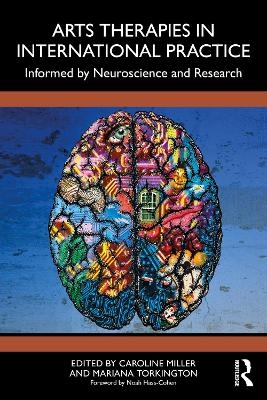
Arts Therapies in International Practice
Routledge (Verlag)
978-0-367-53688-6 (ISBN)
The authors demonstrate how the arts therapies can be adapted creatively to work in different social and ethnic communities, with different ages and with different states of health or ill health. Although there is diversity in their practice and country of practice, they reaffirm key concepts of the arts therapies, such as the importance of the therapeutic relationship, and the key role played by the arts modality with its effects on the brain and nervous system.
This book will appeal to a wide readership, including arts therapists, expressive arts therapists, a range of other psychotherapists and counsellors, students and their teachers, and those interested in the neuroscience of human development.
Caroline Miller, (NZ) MA Clinical Psychology, PGDip Clinical Psychology, BA English/Psychology, BPhil, PG Dip. Dramatherapy, graduated as a dramatherapist in 1991 and has worked as a dramatherapist and clinical psychologist in government services, non-government services, schools, mental health settings, and private practice. Her work has included school counselling, managing and setting up a district health board mental health service for children adolescents and their families, managing a programme for conduct disordered youth, working in schools for children (ages 5–21) with special needs, working with young sex offenders, and working in private practice with adults and young people with sexual abuse trauma, depression, anxiety, and other diagnosed mental health disorders. She has had an extensive supervision practice. She has supported many therapists to develop their writing for publication. Caroline was the inaugural co-director of the MA in arts therapy, a combined arts therapies programme at Whitecliffe College of Arts and Design in Auckland New Zealand. She continued in the position of co-director teaching and supervising master’s level dissertations. This was followed by guest lecturing and workshop invitations. She has presented at several conferences in Australasia and the United Kingdom. Caroline has published several articles and is the editor of two books Assessment and Outcomes in the Arts Therapies: A Person-Centred Approach (London, UK: Jessica Kingsley Publishers, 2014), and Arts Therapists in Multidisciplinary Settings: Working Together for Better Outcomes (London, UK: Jessica Kingsley Publishers, 2016). Mariana Torkington, (NZ) MA Arts Therapy (Clinical), AThR, ANZACATA, MNZAC, ACC Provider, is a registered arts therapist working and lecturing in Auckland and a published author in the arts therapies field. Mariana has worked as an arts therapist for government and non-government agencies and in private practice. She has specialised in working with children, adolescents and families in trauma and abuse recovery. Her special areas of interest include family work, learning disabilities, anxiety, and depression. Mariana is currently lecturing in the newly established Child and Adolescent Psychotherapy Programme at Auckland University of Technology. Mariana spent her childhood and young adulthood living in Argentina and Brazil and speaks Spanish, Portuguese, and English.
Part One: Setting the Scene. Introduction 1. Arts Therapies: Recent Advances Part Two: Arts Therapies in Practice 2. Metaphor and Implicit Memory (Jonah and the missing heart: A story of attachment and dramatherapy) 3. Narradrama as a Three-Act Play: Transformation, Neurobiology, and Discovery 4. Dramatherapy with Adolescents in Malaysia: Be 5. A Multimodal, Multitheoretical Arts-Psychotherapy Approach to Trauma and Depression 6. We are Here Together for A while: Art Therapy Initiatives within a Hospice Setting in Singapore 7. Imagination and Art Therapy: A Bridge to Transformation for Traumatised Clients 8. Singing all Together in the CeleBRation Choir: A Music Therapist's Perspective on Community Singing for Adults who have Neurogenic Communication Difficulties 9. Music therapy for autistic children- responding to contemporary understandings with new research approaches 10.In Circle: The Benefits of Dance as a Community Practice 11. Mind and Movement: Using the Universality of Neuroscience in Dance Movement Therapy Part Three: Reflections and Review 12. Reflections13. Future Development.
| Erscheinungsdatum | 04.01.2022 |
|---|---|
| Zusatzinfo | 3 Line drawings, black and white; 26 Halftones, color; 16 Halftones, black and white; 26 Illustrations, color; 19 Illustrations, black and white |
| Verlagsort | London |
| Sprache | englisch |
| Maße | 156 x 234 mm |
| Gewicht | 480 g |
| Themenwelt | Medizin / Pharmazie ► Medizinische Fachgebiete ► Psychiatrie / Psychotherapie |
| Medizin / Pharmazie ► Physiotherapie / Ergotherapie ► Ergotherapie | |
| Naturwissenschaften ► Biologie ► Humanbiologie | |
| Naturwissenschaften ► Biologie ► Zoologie | |
| Sozialwissenschaften ► Pädagogik ► Sozialpädagogik | |
| Sozialwissenschaften ► Soziologie | |
| ISBN-10 | 0-367-53688-9 / 0367536889 |
| ISBN-13 | 978-0-367-53688-6 / 9780367536886 |
| Zustand | Neuware |
| Informationen gemäß Produktsicherheitsverordnung (GPSR) | |
| Haben Sie eine Frage zum Produkt? |
aus dem Bereich


